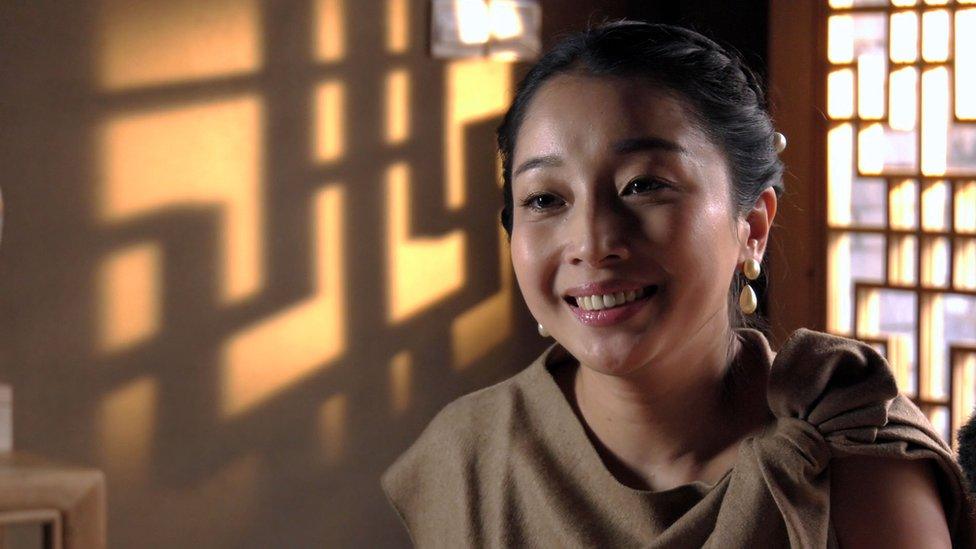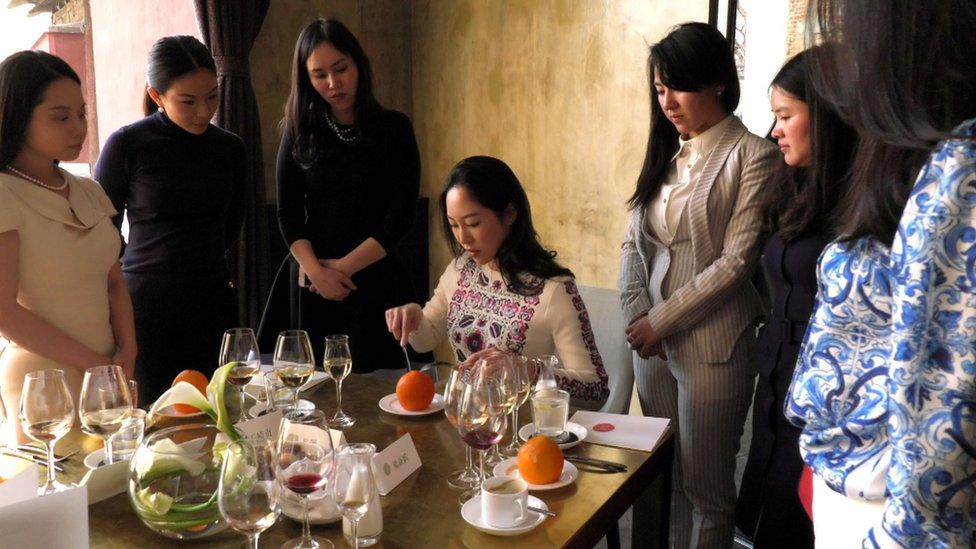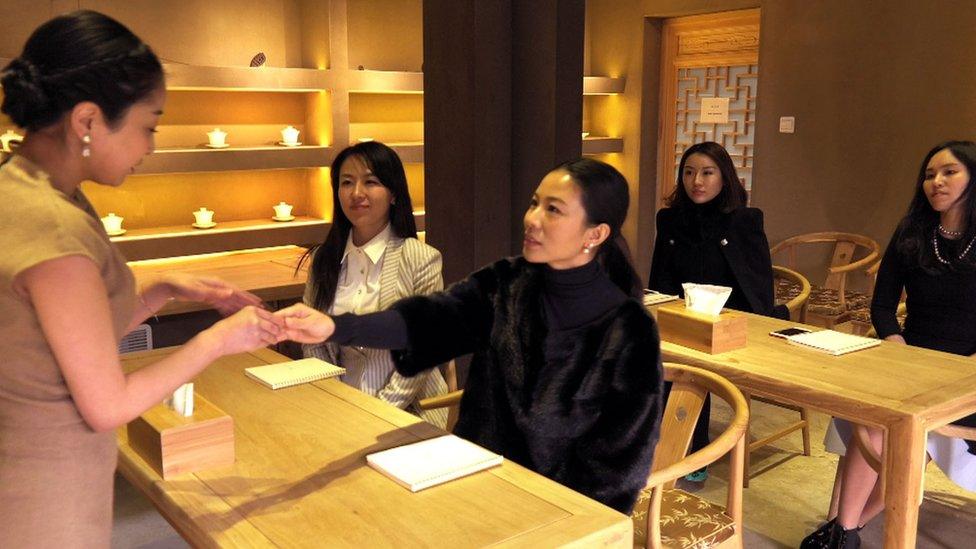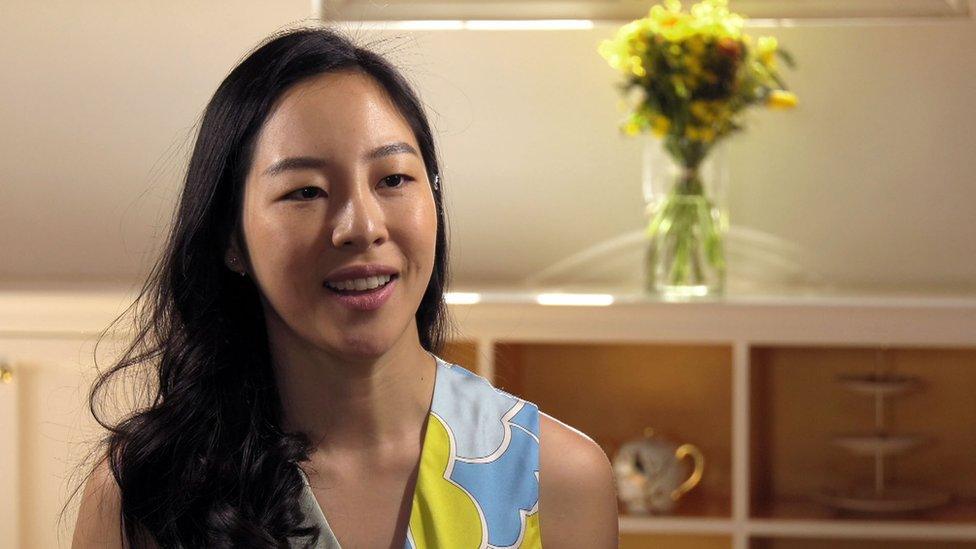A look inside China's first finishing school
- Published
Students learn deportment and the polite way to eat an orange, among other things.
In a secluded courtyard, a lesson in deportment is under way. Some female students, each one with a book balanced on her head, are attempting to walk a few steps without the book falling off.
One volume crashes to the ground, but most of the students make it to the other side of the space without mishap, to the approval of the smiling instructor.
But there's an unusual aspect to this class. It is not happening in Europe, home to many of the world's best-known finishing schools. Instead, it is taking place in Beijing.
Welcome to Institute Sarita, which it claims is China's first finishing school.
It is the brainchild of Sara Jane Ho. A native of Hong Kong, she went to boarding school and university in the USA. After working in investment banking, and for a non-governmental organisation (NGO) in China, she spent some time studying at a Swiss finishing school.
Inspired by what she had learnt, on her return to China she decided to set up a school of her own.

'You have to learn how to behave properly,' says Rebecca Li, the president of Institute Sarita
"Etiquette shouldn't be Chinese or French, it shouldn't be for the rich or for the poor, it should be for everybody," she says.
"The spirit of etiquette, no matter where in the world, is the same - it's about respect and consideration for other people, and how to put other people at ease around you."
'Behave properly'
The school targets an older age group than its European counterparts. It offers two main courses - one for debutantes, and another, offering instruction in how to be a hostess, for married women.
One of the most important subjects it teaches is deportment.
"It's about your character, and the feeling you give to others," explains the institute's president, Rebecca Li, who has also attended a Swiss finishing school.
"You should make people feel you are confident - a person you can trust."
How you stand, how you sit, how you walk, how you enter a room, how you shake hands - all these things can have an impact on how you are perceived and how others around you feel, according to Ms Li, "so you have to learn how to behave properly".

The 'polite' way to eat an orange is with a knife and fork, according to Institute Sarita
Other lessons include the polite way to eat an orange (which involves using a knife and fork), table setting, and dinner party seating arrangements.
The vast majority of those who attend the school are women. Men occasionally take part in classes aimed at more mature students, such as lessons in dating etiquette, and managing personal relationships.
Ms Ho believes the fact that there is demand for courses offered by schools like hers is partly a result of the rapid changes happening in Chinese society.
She says that women in particular can find it hard to adjust.
"In the last century Mao said, 'women hold up half the sky'; he liberated women by letting them enter the workforce, and now in the career world, you do see women advancing," she explains.
"But there's [also] 2,000 years of Confucian values which say 'the woman should be the noble protector of the home, and her place is the home, and to bear children.'"

The majority of the school's attendees are women
She also believes that globalisation is having a big impact, particularly on the wealthy.
"Elite Chinese are starting to send their children to boarding school, they're buying property abroad, they're emigrating abroad," she says.
"They are learning very quickly, and they're becoming a lot more cosmopolitan, which is why etiquette, now more than ever, is very relevant."
'An investment'
Her students agree. Candice Li runs her own business, which conducts research into the luxury market. She often travels internationally, and says that she has become more confident in dealing with foreigners after attending the Institute's classes.
Studying at the school is far from cheap, with a 10-day debutante course costing around £8,500 (€11,000; $12,200).
But for another student, Chelsea Chen, "how much you pay is not important, it's how much you can get from the course."
Ms Chen says she regards her attendance as an "investment… for my family… and for everyone surrounding me". She also hopes that, if in the future, she has children, she will be able to pass on what she has learnt to them.

'I always think about how can I make this into something bigger?' says Sara Jane Ho
Institute Sarita is no longer the only player in the market for etiquette training in China, and it is facing increasing competition. How does Ms Ho see the future of her enterprise?
"In some ways it's kind of a silly little business," she says. "We charge high prices, but the volume is very low… our classes are very small… and our costs are high… but I went to Harvard Business School, and I always think about how can I make this into something bigger?"
Ms Ho says her role model is Martha Stewart, the American author, TV host and entrepreneur, who "provided a guide for the suburban housewife" on how to cook, decorate, and entertain.
"I want to provide the same to the modern day Chinese woman," she says.
"I want to help her be the best mother that she can be, be the best wife that she can be, …make the home a place where she can invite loved ones and friends; and also [to learn] how to live, in this modern day world."